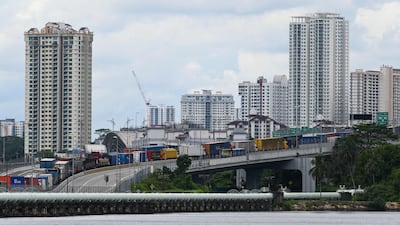Malaysia’s economy returned to contraction in the third quarter, the first Southeast Asian economy to report a renewed slump, but the central bank said it expects growth to rebound fast as virus curbs are eased.
Gross domestic product in the three months ended September shrank 4.5 per cent from a year earlier, Malaysia’s central bank said Friday, worse than the 2.6 per cent drop predicted by analysts in a Bloomberg survey. Compared to the previous three months, gross domestic product fell 3.6 per cent on a seasonally adjusted basis.
Despite last quarter’s slump, the central bank reaffirmed the government’s outlook for economic expansion this year at 3-4 per cent, with headline inflation at 2-3 per cent. It also reiterated the official 2022 outlook for GDP to grow 5.5-6.5 per cent. Monetary policy will remain accommodative to lend support and ensure price pressures are manageable, Nor Shamsiah Yunus, governor of Bank Negara Malaysia, said in a virtual briefing on Friday.
“We expected a dip and this turned out to be much sharper than expected,” said Wellian Wiranto, an economist at Oversea-Chinese Banking Corporation in Singapore. Still, the high vaccination coverage and the re-opening of the economy will help deliver a “stronger recovery momentum,” he said.
Malaysia’s main equity index gained 0.5 per cent at the midday break. The ringgit rose 0.1 per cent to 4.1675 per dollar while 10-year bond yields were up two basis points to 3.60 per cent.
The slowdown was seen across all segments of the economy, Ms Shamsiah said. Even so, the gradual lifting of containment measures and improvements in the labor market will help growth to improve in the fourth quarter, she added.
The deeper-than-expected slowdown last quarter “looks to be the bottom of the cycle as vaccinations have reached a critical mass, the virus wave has retreated, and the slashing of curbs has unleashed pent-up demand,” said Tamara Mast Henderson, an Asean economist for Bloomberg Intelligence.
Travel Corridor
The outlook comes days after Malaysia decided to open a vaccinated travel lane with Singapore, its first such initiative, and agreed to begin a travel corridor with Indonesia early next year. Malaysia’s rapidly widening vaccine coverage has allowed the local economy to reopen in recent months, with all but two states in the final phase of the government’s national recovery plan.
The nation is also set to reopen the tourist haven of Langkawi islands to overseas visitors on Monday under a pilot project. The government will evaluate the project before emulating it in other tourist spots in the country, Prime Minister Ismail Sabri Yaakob said last month.
The government in October unveiled a record $80 billion spending plan for next year as it seeks to spur the long-delayed economic rebound, and allocated 23bn ringgit for Covid stimulus measures alone.
The central bank last week maintained its benchmark policy rate at a record low of 1.75 per cent, supporting a nascent economic recovery as virus curbs ease and inflation remains under control. Headline inflation is likely to remain moderate next year, Ms Shamsiah said Friday, reiterating the bank’s comments last week, and added that the bank will be “mindful of any premature withdrawal of monetary support.”
The Monetary Policy Committee will continue to monitor signs of a “more entrenched recovery in an environment of price stability,” she said.
Risks remain for the government’s growth outlook. Two upcoming state elections in Malacca and Sarawak could undo the recent drop in new Covid infections to the fewest since early June. The reproduction factor of the virus, known as R-naught, has climbed back to the key threshold of 1, and the government is monitoring hospital admissions and other leading indicators, health minister Khairy Jamaluddin said in a tweet on Friday.
The health ministry has issued fines as campaigning politicians violated virus protocols ahead of voting day on November 20. A spike in cases after an election in Sabah state last year fueled public anger against former premier Muhyiddin Yassin, helping to precipitate the fall of his government in August.

